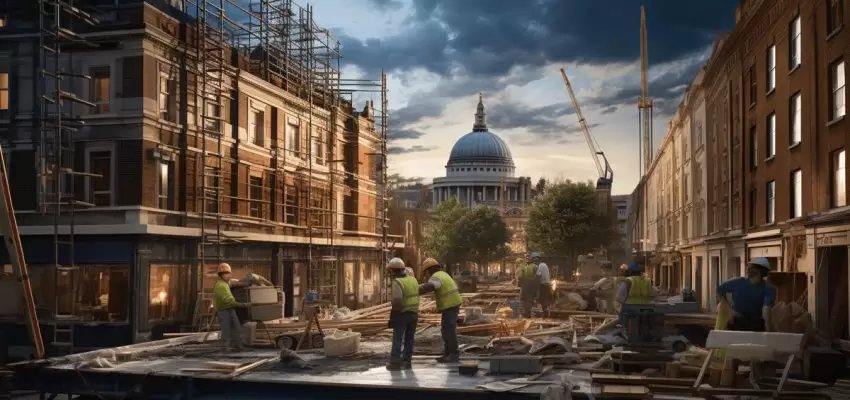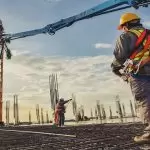A civil contractor is one of the most basic elements that will determine the direction an engineering project will take and its overall outcome. Determining whether the person will help iron out the project or cause problems the whole way through means choosing the right civil contractor. This guide will take you through all the essential steps to selecting the perfect civil contractor for your needs-be it is a small home renovation or a big infrastructure project.
Post your Requirement
Who Are Civil Construction Contractors?
Civil construction contractors are a class of people specialized in the planning, design, and execution of construction projects involving infrastructures and civil engineering. This covers a wide range of projects: roads, bridges, airports, water supply systems, and residential or commercial buildings. The people who are civil construction contractors play a very crucial role in projects that are accomplished safely, efficiently and with boundaries within legal and environmental standards.
Role Of Civil Contractors In Construction Projects
Civil contractors are responsible for managing the construction process from beginning to completion, including project management, resource allocation, and labour coordination. Such persons actually work together with architects, engineers, and clients to ensure that the specifications of the project are met on time and within budget. Their task also includes seeking necessary permits for the project, insisting that the project meets with local authorities’ regulations, and taking care of subcontractors.
Why Selecting The Right Contractor Matters?
It is hence essential to choose the correct civil contractor, as this determines the result of your project. A good contractor would negotiate all problems effectively, keep standard safety features, and probably ensure that the work done to your specifications meets the client’s vision. Poor selection easily leads to delays, budget overruns, and inferior results, which are likely to affect the success of the project and your investment.
How To Choose The Best Civil Contractor Near You?
1. Understanding Your Project Requirements:
- Defining The Scope Of Your Project: Before you start searching for a contractor, it is very vital to spell out the scope of your project. This involves several factors. Firstly, you have to decide on the size and complexity of your project. Do you just want to redo the bathroom, or is it something far more complicated, like doing a commercial building? Each project type has different demands that will affect the sort of contractor you will need.
- Outline A Budget Range: A clear financial framework helps limit the possibilities of potential contractors who can work within your parameters. Likewise, define your timeline for the completion of the project. Understanding your timeline will allow you to communicate expectations and assess the feasibility of each contractor’s proposed timeline.
- Specific Needs End: Once you have identified the scope, you can now think about what services you need the contractor to perform. This would depend on the nature of your project and may range from site preparation to structural engineering, environmental compliance, or comprehensive project management. Each of these has different demands on the expertise, so knowing your needs will ensure hiring an appropriate contractor for your project.
- Documentation Preparation: Good documentation will make the process of selecting a contractor go quite smoothly. This can include detailed drawings, project specifications, and any necessary permits. It is helpful to have a well-prepared outline of the project to help with the communication process between you and the potential contractors and also help them give you accurate estimates.
2. Searching For Available Contractors
- Begin With Referrals: Without a doubt, word of mouth is one of the best sources of good contractors. Undoubtedly, a lot of your friends, family members, and colleagues must have recently built or renovated their homes. This is probably the most professional and often the best source of information for a contractor’s reliability, quality of work, and customer service.
- Online Sources: Besides personal referrals, the internet may be your best ally in this respect. The following websites assist with contractor directories as well as customer reviews: Angie’s List and HomeAdvisor. Even social media platforms such as Facebook or LinkedIn may come in handy where you can tap into local community groups. Not to forget, sites belonging to contractors may be visited to evaluate their services, portfolios of work done in the past, and customer testimonials.
- Verifying Credentials: In addition, one needs to scrutinize the credentials of any contractor before seriously considering them. They should be licensed and certified to do business in your locality. Finally, check their insurance provisions, liability, and workers’ compensation; this will guard against liabilities that may crop out in the course of the project.
3. Portfolio Evaluation
- Portfolio Verification: Shortlist in hand, it is now the time to view his or her portfolio. A contractor’s body of work can shed much light on his or her ability. Check for projects of comparable size and complexity to the project you have in mind; this will help you determine whether the contractor has experience working on projects of that scale. Next, observe how good the work was: is it something that matches up to what you’re looking for? One other option is that having had a variety of experiences might just mean that a contractor is resourceful and able to handle a range of different challenges and demands.
- Checking References: Contacting former clients is also included in the list. Ask specific questions regarding their experience with the contractor. Ask if the project was completed on time and within the budget, how the contractor dealt with the challenges, and if they would hire the same contractor again. This knowledge may prove to be invaluable in the assessment of the reliability of a contractor and his or her work ethics.
4. Initial Consultations
- In-Person Meetings: Select a few, and ask to meet each contractor in person. This will give you the chance to further discuss your project and assess their communication skills as well as professionalism. You’ll be able to see how they work and if that style of working might suit your project.
- The Perfect Questions: Prepare a comprehensive list of questions you’d want to discuss with them. More important inquiries would be related to their experience with similar projects, their approach to managing and communicating during the project, and if they can provide you with a detailed timeline of the project with certain milestones. The answers will help you to judge not just their competency but also their ability to communicate and understand your needs.
- Compatibility Assessment: Compatibility is the key to a successful partnership. Observe whether the contractor’s working style is the same as yours. You can work well with a contractor who shares your values and approach, and this will make the whole experience enjoyable and smoother to be with.
5. Reviewing Bids And Proposals
- Requesting Detailed Proposals: After having met the potential contractors, ask them to give you a written proposal indicating their estimates. At least, the proposals must indicate the cost breakdown, an overall timeline for the project, a payment schedule, and details on the materials and labour used. In this way, it becomes easier and possible to compare contractors when such proposals are clear and comprehensive.
- Comparing Costs: When reviewing the bids, obviously your concern is to be sure that you are getting the best price. Yet do not make your decision based solely on the low bid. Don’t immediately default to the lowest quote without regard for what value the package is going to bring. Consider the final package, especially quality, service, and expertise. Paying a little bit more for a higher quote may be well worth it when working with a contractor who is going to bring much more experience and/or superior materials to the table.
- Negotiating Terms: Do not be hesitant to negotiate terms once you have received the proposals for review. This could be acceptance of lower pricing or longer timelines to suit your needs or expectations or simply some adjustment in the specifics of the project. Communication at this stage will lead to a good working relationship with your contractor too.
6. Assessing Communication and Professionalism
- Assessing Responsiveness: Another point about choosing a contractor will be the responsiveness level. Keep an eye on how quickly they respond to calls or emails during discussions. A good and prompt contractor is likely to maintain the same professionalism all the way through the project.
- Seeing Good Professionalism: Rate the contractor’s professionalism when you meet with them. Is he/she punctual, organized, and respectful? A professional attitude may be a sign of how they are going to handle their responsibilities in your project. This would give you confidence that they will undertake challenges and help you build a working relationship.
7. Assessment of Legal And Financial Condition
- Licensing And Insurance: Before finalizing your choice, you should confirm whether the contractor has the required licenses and insurance coverage. This will protect you from liabilities, but also it will ensure that the contractor operates legally and ethically.
- Financial Stability Evaluation: Check out how soundly the contractor stands financially to be sure they are big enough to take on your project. You could start by asking for suppliers’ references or credit reports. A contractor that is above board financially has an excellent chance of finishing a project free of cash flow problems.
8. Assessing Contracts
- Know Your Contract Terms: When the contractor is finally selected, it follows that the contract needs careful analysis. This means that it is bound to comprise crucial elements, such as the scope of work, terms in payment, timelines, and change order procedures, among others with respect to mechanisms for dispute resolution. It is all about having a well-articulated contract because it is an insurance system for both parties.
- Seeking Professional Consultation: You should consult if any terms and conditions of the contract appear unclear or inspiring. This will safeguard your interest and clarify legal terminologies that you may be unacquainted with.
9. Managing The Project
- Ensure Good Communication Channels Are Open: Once you undertake a project, you’ll want to ensure that you keep open communication channels with your contactor. Holding regular meetings and/or calls can help identify problems before they get out of hand. You should also develop a communication plan stipulating how often you will meet or communicate so that you don’t lose track of the project.
- Tracking The Progress: Monitoring Timelines and Budgets as the project unfolds: There will be hiccups and problems that arise at some point, which forces you to involve your contractor in solving them. This proactive act will help address the problems while it is still easier to resolve than allowing the problems to balloon into big ones.
- Flexibility: Every construction project is bound to face unlooked-for problems. The flexibility of mind and coordination with the contractor will aid you in dealing with problems much more quickly. Flexibility may produce unusual solutions and leads eventually to successful outcomes.
10. Review After The Project
- Final Outcomes Evaluation: As you complete your project, reflect on the final results. Compare the outcome to the expectations you set in the beginning. Do they meet the timelines agreed upon? Were they of the expected quality? Are you satisfied with the outcome of the project? This reflective process may help you deliver the best for the future.
- Giving Feedback: Leave a review for your contractor to highlight strengths and areas of improvement. Feedback not only helps out other potential clients but also gives the contractor constructive ideas for their future projects.
- Future Projects: Should you be satisfied with the contractor’s work, keep their contact information handy for your future projects. Building a relationship with a good contractor makes it easier to handle the processes in subsequent construction endeavours.
Conclusion
Selection of the proper civil contractor for any small or big project requires strict consideration and extensive research. A good outcome can be expected from a person due to awareness of the requirements of the project, evaluation of potential contractors, and clear communication throughout the process. Your vision will come alive with the help of an efficient contractor, and the construction process will turn into a real enjoyment. Irrespective of whether it’s a new house or office renovations, it is the quality of your project with a successful outcome that hangs in the balance based on the contractor one chooses.
Read Also: A Comprehensive Guide To Working With Civil Contractors in Delhi NCR























Post A Comment